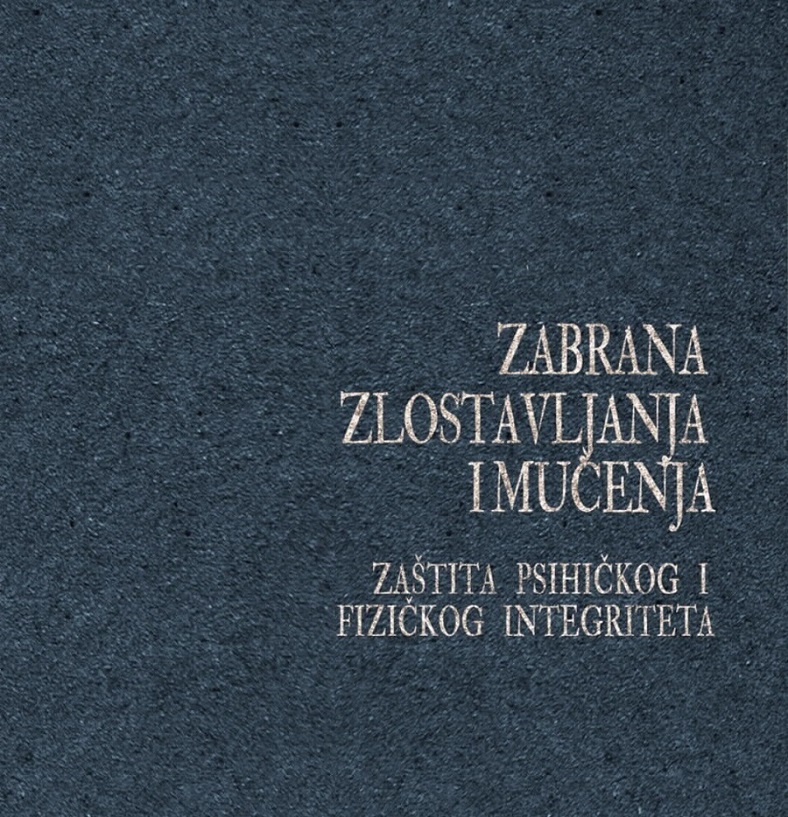
PRESS RELEASE ON THE PUBLICATION ‘PROHIBITION OF ILL-TREATMENT AND TORTURE - PROTECTION OF MENTAL AND PHYSICAL INTEGRITY’ PUBLISHED BY THE POLICE DIRECTORATE OF MONTENEGRO, COUNCIL OF CIVIC CONTROL OF THE POLICE AND THE NON-GOVERNMENTAL ORGANIZATION (NGO) ‘HUMAN RIGHTS ACTION’:
The publication of the ‘Prohibition of Ill-treatment and Torture - Protection of Mental and Physical Integrity’ was published by the Police Directorate and the Council of Civic Control of the Police and the Non-Governmental Organization (NGO) ‘Human Rights Action’ starts with a basic rule that respect of human rights must be basis for police conduct and which promotes the prevention and eradication of police ill-treatment.
Publishing Director is Aleksandar Sasa Zekovic, MsC.
The Police Directorate and the Human Rights Action have translated significant amount of material, including the more recent CPT standards, which, for the first time, have become linguistically more accessible to the Montenegrin and regional public.
The publication consists of a joint preface of the publisher and three sections: (1) part of the Report of the European Committee for the Prevention of Torture and Inhuman or Degrading Treatment or Punishment (CPT) on its visit to Montenegro from 9 to 16 October 2017 which relates to the police with recommendations aimed at increasing protection of persons deprived of liberty, (2) Instruction of the Director of the Police Directorate of Montenegro on a visit of the CPT to Montenegro, outlining a plan for how to implement and incorporate the recommendations into Montenegrin police policy and practice (2) and (3) CPT standards - extracts from general reports relevant to everyday police work.
CPT’s reports across Europe are the most representative review of respect for human rights of persons deprived of liberty. Countries, international organizations, the European Court of Human Rights, NGOs, the media and the academic community all have full confidence in CPT’s reports.
Although the CPT, in its report on the visit that took place in 2017, noted a certain progress in the treatment of persons detained by the police compared to the previous visit in 2013, it was concluded that the culture of ill-treatment by the police was not effectively suppressed and that persons deprived of their liberty in Montenegro are still under a serious risk of being ill-treated by police officers. CPT assessed that ill-treatment by police officers in Montenegro happens to be a fact which appears as an accepted practice within the current police culture, and it was therefore recommended that the authorities show determination to combat ill-treatment and ensure in any way they can that police officers at all levels receive the message that no ill-treatment will be tolerated and that both direct perpetrators and their superior officers will be punished accordingly. It was pointed out that there was an intention to thwart the investigation and to ensure the impunity of those who abused citizens.
The intention of the publisher is to present the CPT’s report to Montenegro to the police officers and the public in a greater detail, in the part concerning the actions of the Police Directorate, to encourage the implementation of recommendations, in order to make police officers more conscientious and better at their work, and to improve knowledge of the CPT standards which are important to the police.
Of particular importance, because of the messages it sends, the preface jointly signed by Director of the Police Directorate, Veselin Veljovic PhD, President of the Council of Civic Control of the Police, Aleksandar Sasa Zekovic MsC, and Director of the Human Rights Action, Tea Gorjanc Prelevic MsC.
‘The fact that the CPT is jointly published by the Police, civic control of the police and human rights NGO is significant and unique. It is acknowledged that inappropriate and unlawful treatment by police officers does exist, that the report itself is significant for the protection of human rights in Montenegro, and that its publication and resulting comments encourage dialogue and help prevent ill-treatment of persons deprived of liberty’ is stated in the joint preface.
‘The Police Directorate has raised concerns about any instance of unlawful treatment by police officers, primarily the one that manifests itself as brutality or exceeding the use force based on findings published in the report. A more determined and more visible fight against unlawful and unprofessional police treatment has been announced.’
‘In the context of the issued recommendations, the Police Directorate decided to provide enhanced monitoring of police conduct and treatment of persons deprived of liberty in the course of the following period. The essence of the above action is to enhance integrity and accountability, and enable investigations and effective oversight of police work. In this regard, a plan was made to implement the recommendations from the CPT’s Report on its visit to Montenegro from 9-16 October 2017.’
‘The joint publication of the report also represents a clear message from the Police Directorate that it wishes to develop and maintain a close, open and positive relationship with civic and other police oversight bodies and civil society organisations’ is stated in the preface of the Director of the Police Directorate, President of the Council of Civic Control of the Police and Director of the Human Rights Action.
The publication is available at the following links:
http://www.up.gov.me/informisanje_javnosti/publikacije
http://www.hraction.org/wp-content/uploads/2019/12/CPT-web.pdf
